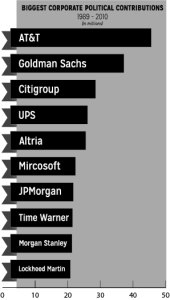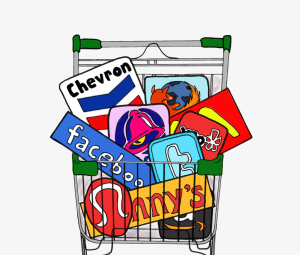
Just days after crude comments by Abercrombie and Fitch’s CEO, Mark Jefferies, surfaced, the company reported that its stock fell by 17 percent. Abercrombie and Fitch’s experience with what’s known as “consumer outrage,” a trend in which a company’s unethical behavior leads to protests and boycotts, is not uncommon today.
Regarding the role of companies, Sophmore Henry McNamara says, “Objectively, corporations should be there to provide products and jobs for people and give back to society. But, corporations tend to be more hungry and feed on people rather than help them.”
Company perception, similarly, affects consumer decisions. Says senior Katerina Johnson, “The way [companies] treat their employees absolutely affects my opinion on shopping there.”

Company-consumer relationships can be rocky—companies depend on consumers to buy products, and consumers depend on companies to provide products. So, where does the power lie, with the corporation or the consumer?
Junior Cecily Bohanek says, “I feel that consumers have power in that they can make or break a company. If no one is going to buy your product, then you’re just not going to stay afloat. But then there are consumers who, especially those with low income, don’t have a lot of choice and can’t afford to buy that $20 jar of peanut butter just because it’s organic. I think companies thrive on people having no choice, especially for companies that are built upon having cheap products.”
While some fast food brands and department stores have been affected by outraged consumers, a majority of the most significant protests that resulted in company action came from more notable brands, like Abercrombie and Fitch, Lululemon and Barneys, according to Time’s Magazine 2011 list of “notable instances from the past year of consumers and advocacy groups boycotting.”
While Abercrombie and Fitch’s incident ended in economic decline, McDonald’s, which has been heavily criticized for its low wages, unsanitary environments, and unhealthy products, has not met a sale’s decrease over 5 percent. While protests characteristically decrease company sales, effects are generally most heavily felt by companies with unsatisfied wealthy consumers who have the ability to afford selection. Thus, the consumer’s power derives from socioeconomic status.
Consumer choice can also be restricted by factors such as age, dependency and location.
Sophomore Tyee Gallegos says, “I watched this documentary recently about mass production and how it’s about producing and not about who produces the actual products. For me, its kind of hard not to keep up with the latest technology, but I still feel bad. I know that iPhones are coming from probably a factory with not the best working conditions, but I still went with the iPhone. A lot of what I get has to do with what my parents get me. I think for a lot of young people, the things they buy has to do with what their parents want to get.”
Discrimination and prejudice are just two of many reasons why companies are protested.
Bohanek says, “I feel like you can’t afford to be prejudiced as a company. Unless you’re like printing Bibles or something, then you’re not serving a specific group of people.”
Aragon students have found their own ways of battling companies. Senior Anish Amirapu says, “If I don’t like the company, then I probably won’t buy their stuff. Like, Chevron, the gas place—I know where they get their oil, or at least I know that their company is not up to oil company standards, so I go to Arco. I think we live in a pretty conservative and ethical society, so the integrity of companies really matters to people.”
Embodying company malpractice, Texaco, which merged with Chevron in 2001, used obsolete and illegal oil drilling practices, destroyed much of the Ecuadorian Amazon and contaminated local water supplies, causing a slew of diseases which infected the local people. Today, Ecuador seeks to sue the Chevron Corporation for $9 billion in reparations, and many online campaigns have commenced against Chevron, including a website called “ChevronToxico.” Johnson says, “My brother used to work at PacSun. Every day he would come home telling us about how poorly he was treated and since then I haven’t shopped there. He was on tasks that didn’t make sense. He was yelled at for the simplest of reasons [or] if he didn’t fold a shirt correctly, like if he was a centimeter off. Prices are really high, so I don’t shop there anymore.”
In addition to boycotting, some students encourage their friends to stop supporting certain companies.
Bohanek says, “When people wear clothing from companies I don’t support I usually try to gently give them a hand. A lot of the time people are reluctant to change. A lot of people aren’t going to make drastic changes to their lifestyle. But I keep dropping subtle hints. I don’t want to be rude, but sometimes you have to be rude in order to make the world a better place.”
“The Internet has a lot of influence on consumers,” says Amirapu. “If a restaurant gets a bad review, then people won’t want to go there. I think this is where a lot of consumers get their power, from spreading opinion over the Internet.”
With the onset of the modern technological era, social media has become a popular catalyst for massive consumer protests.
Bohanek says, “I think that social media can be either a curse or a blessing, and you really have to pick and choose how you use it. Like, Taco Bell has a really great social media presence, but there’s always some uproar about a clothing company because people can actually see your products and argue with them about it. They can say that they’re ripping off some artists style or using some image on a T-shirt.”
Popular forms of online protests include petitions, boycotts and information spreading.
Bohanek continues, “I admire people who do those sorts of online petitions, but I really don’t think it helps that much. What’s going to happen is that the company is just going to release some sort of statement saying they’re sorry and change one thing. Then, they’re just going to keep doing all of the bad things they were previously doing. I think these campaigns are a great idea in principle, but I don’t think that the companies who they’re targeting really do that much change.”
According to an article by the Salesforce Marketing blog, “The consumer is no longer the Average Joe,” and companies must account for the diversity of their markets. Social media allows companies to become more interactive with their customers.
Bohanek says, “My dad works for a company that sells concert tickets, like a website. They are very down-to-earth and they care about their customers. They have a Twitter and a very reasonable amount of followers. So, I think if you have a company that is already built on taking care of your consumers, then I think you benefit a great deal from social media because you can get even more in touch with them.”
Yet, what’s to come for the future of the consumer? According to The Economist, consumers are gaining power, especially in terms of the energy and fuel industry.
Bohanek says, “This also goes for a lot of other countries, but in our country in particular, consumerism is huge. I think we have a responsibility as a country to change the corrupt elements. I don’t think it’s going to happen anytime soon, but I think it all depends on people doing things and taking charge.”



